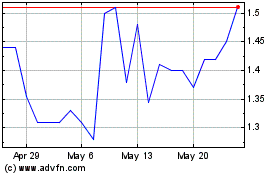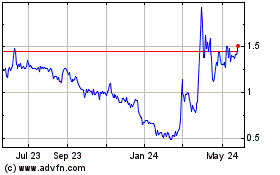IMUNON, Inc. (NASDAQ: IMNN), a clinical-stage company in late-stage
development with its DNA-mediated immunotherapy, today announced
the presentation of new clinical data from the recently completed
Phase 2 OVATION 2 Study of IMNN-001, its investigational
interleukin-12 (IL-12) immunotherapy for the treatment of advanced
ovarian cancer based on the company’s proprietary TheraPlas®
technology. Results will be highlighted in a late-breaking poster
session at the Society for Immunotherapy of Cancer (SITC) 39th
Annual Meeting, taking place November 6-10, 2024, in Houston, Texas
and virtually.
IMNN-001 is an IL-12 DNA plasmid vector encased
in a nanoparticle delivery system that enables cell transfection
followed by persistent, local production and secretion of the IL-12
protein. IL-12 is one of the most active pluripotent cytokines for
the induction of strong anti-cancer immunity acting through the
induction of T-lymphocyte and natural killer cell proliferation,
inhibiting tumor mediated immune suppression.
A total of 112 patients with newly diagnosed
advanced ovarian cancer (intent-to-treat population) were enrolled
in the Phase 2 OVATION 2 Study with a median follow-up of 24
months. Study participants were randomized 1:1 to evaluate the
safety and efficacy of IMNN-001 (100 mg/m2 administered
intraperitoneally weekly) plus neoadjuvant and adjuvant
chemotherapy (NACT) of paclitaxel and carboplatin compared to
standard-of-care NACT alone. The results being presented at the
SITC Annual Meeting, as of June 21, 2024, demonstrated:
- Patients treated with IMNN-001 plus
standard-of-care NACT lived 11.1 months (35%) longer than patients
treated with NACT alone with a median overall survival (OS) of 40.5
months and 29.4 months, respectively (hazard ratio 0.74).
- IMNN-001 treatment was associated
with better surgical outcomes compared to NACT alone with a
surgical response rate of 64.6% and 52.1%, respectively. The
chemotherapy response score, another measure of treatment benefit,
was 26.1% in the IMNN-001 treatment group versus 13.0% in the
control group.
- IMNN-001 was also associated with
an improvement in progression-free survival (PFS) with a median PFS
of 14.9 months in the IMNN-001 treatment group compared to 11.9
months in the control group (hazard ratio 0.79).
- The rate of complete response for
best overall response, a measure of tumor shrinkage, was comparable
across all study participants (n=1 in both groups, or 1.7% in
IMNN-001 treatment group, 1.9% in the control group) when measured
early in the study at debulking surgery.
- In a subgroup analysis of patients
who received a PARP inhibitor as maintenance therapy, patients in
the IMNN-001 treatment arm had a median PFS of 33.8 months versus
22.1 months in the control arm (hazard ratio 0.80) and median OS
was not reached for the treatment arm versus 37.1 months for the
control arm.
- IMNN-001 was generally well
tolerated, with the most common adverse events (AEs) primarily
gastrointestinal events (abdominal pain, nausea, vomiting). Pain
management protocols were found to be effective. There were no
reports of cytokine release syndrome or any other serious immune
related AEs.
“These results from OVATION 2, including overall
survival and progression-free survival among women with advanced
ovarian cancer treated with IMNN-001 and NACT compared to
standard-of-care NACT alone, reflect a meaningful improvement and
show consistency across various endpoints and patient subgroups,”
said Stacy Lindborg, Ph.D., president and chief executive officer
of IMUNON. “This consistency brings great hope and excitement that
these results can be replicated in Phase 3, and that IMNN-001 may
offer a significant advancement in the treatment landscape for
ovarian cancer. We look forward to our end-of-Phase 2 in-person
meeting with the FDA to discuss plans for the Phase 3 pivotal
trial, which we expect to start in the first quarter of next
year.”
“IMNN-001 is the first immunotherapy to achieve
a clinically effective response in ovarian cancer, including
benefits in both progression-free and overall survival, let alone
in a first-line treatment setting,” said study investigator and
presenter Jennifer Scalici, M.D., Professor, Division of
Gynecological Oncology, Emory University School of Medicine. “It is
also especially encouraging that IMNN-001 offers benefits when used
alongside PARP inhibitors, which have been very important in the
treatment of advanced ovarian cancer but still present limitations
in terms of OS benefits. There is a significant unmet need in
treating women with ovarian cancer, which is the second deadliest
gynecologic malignancy, and the promising results from the OVATION
2 Study represent the potential of IMNN-001 to offer a much-needed
treatment option.”
The details of the SITC poster presentation are
as follows:
Abstract Title: Phase I/II
study of Safety and Efficacy of Intraperitoneal IMNN-001 with
Neoadjuvant Chemotherapy of Paclitaxel and Carboplatin in Patients
Newly Diagnosed with Advanced Epithelial Ovarian
CancerPresenting Author: Jennifer Scalici, M.D.,
Professor, Division of Gynecological Oncology, Emory University
School of MedicineDate: Friday, November 8,
2024Time: 12:15-1:45 p.m. and 5:30 - 7:00 p.m.
CSTAbstract Number: 1505
As previously announced, IMUNON plans to hold an
End-of-Phase 2 meeting with the U.S. Food and Drug Administration
(FDA) in person to discuss the design for a Phase 3 pivotal study
of IMNN-001 in advanced ovarian cancer, with the trial expected to
start in the first quarter of 2025.
About the Phase 2 OVATION 2
Study
OVATION 2 evaluated the dosing, safety, efficacy
and biological activity of intraperitoneal administration of
IMNN-001 in combination with neoadjuvant and adjuvant chemotherapy
(NACT) of paclitaxel and carboplatin in patients newly diagnosed
with advanced epithelial ovarian, fallopian tube or primary
peritoneal cancer. Treatment in the neoadjuvant period is designed
to shrink the tumors as much as possible for optimal surgical
removal after three cycles of chemotherapy. Following NACT,
patients undergo interval debulking surgery, followed by three
additional cycles of adjuvant chemotherapy to treat any residual
tumor. This open-label study enrolled 112 patients who were
randomized 1:1 and evaluated for safety and efficacy to compare
NACT plus IMNN-001 versus standard-of-care NACT. In accordance with
the study protocol, patients randomized to the IMNN-001 treatment
arm could receive up to 17 weekly doses of 100 mg/m2 in addition to
NACT. As a Phase 2 study, OVATION 2 was not powered for statistical
significance. Additional endpoints included objective response
rate, chemotherapy response score and surgical response.
About IMNN-001
Immunotherapy
Designed using IMUNON's proprietary TheraPlas®
platform technology, IMNN-001 is an IL-12 DNA plasmid vector
encased in a nanoparticle delivery system that enables cell
transfection followed by persistent, local secretion of the IL-12
protein. IL-12 is one of the most active cytokines for the
induction of potent anticancer immunity acting through the
induction of T-lymphocyte and natural killer cell proliferation.
IMUNON previously reported positive safety and encouraging Phase 1
results with IMNN-001 administered as monotherapy or as combination
therapy in patients with advanced peritoneally metastasized primary
or recurrent ovarian cancer, and completed a Phase 1b
dose-escalation trial (the OVATION 1 Study) of IMNN-001 in
combination with carboplatin and paclitaxel in patients with newly
diagnosed ovarian cancer.
About Epithelial Ovarian
Cancer
Epithelial ovarian cancer is the sixth deadliest
malignancy among women in the U.S. There are approximately 20,000
new cases of ovarian cancer every year and approximately 70% are
diagnosed in advanced Stage III/IV. Epithelial ovarian cancer is
characterized by dissemination of tumors in the peritoneal cavity
with a high risk of recurrence (75%, Stage III/IV) after surgery
and chemotherapy. Since the five-year survival rates of patients
with Stage III/IV disease at diagnosis are poor (41% and 20%,
respectively), there remains a need for a therapy that not only
reduces the recurrence rate, but also improves overall survival.
The peritoneal cavity of advanced ovarian cancer patients contains
the primary tumor environment and is an attractive target for a
regional approach to immune modulation.
About IMUNON
IMUNON is a clinical-stage biotechnology company
focused on advancing a portfolio of innovative treatments that
harness the body’s natural mechanisms to generate safe, effective
and durable responses across a broad array of human diseases,
constituting a differentiating approach from conventional
therapies. IMUNON is developing its non-viral DNA technology across
its modalities. The first modality, TheraPlas®, is developed for
the gene-based delivery of cytokines and other therapeutic proteins
in the treatment of solid tumors where an immunological approach is
deemed promising. The second modality, PlaCCine®, is developed for
the gene delivery of viral antigens that can elicit a strong
immunological response.
The Company’s lead clinical program, IMNN-001,
is a DNA-based immunotherapy for the localized treatment of
advanced ovarian cancer that has completed Phase 2 development.
IMNN-001 works by instructing the body to produce safe and durable
levels of powerful cancer-fighting molecules, such as
interleukin-12 and interferon gamma, at the tumor site.
Additionally, the Company has entered a first-in-human study of its
COVID-19 booster vaccine (IMNN-101). IMUNON will continue to
leverage these modalities and to advance the technological frontier
of plasmid DNA to better serve patients with difficult-to-treat
conditions. For more information, please visit www.imunon.com.
Forward-Looking Statements
IMUNON wishes to inform readers that
forward-looking statements in this news release are made pursuant
to the “safe harbor” provisions of the Private Securities
Litigation Reform Act of 1995. All statements, other than
statements of historical fact, including, but not limited to,
statements regarding the timing for commencement of a Phase 3 trial
of IMNN-001, the timing and outcome of the Company’s End-of-Phase 2
meeting with the FDA, the timing and enrollment of the Company’s
clinical trials, the potential of any therapies developed by the
Company to fulfill unmet medical needs, the market potential for
the Company’s products, if approved, the potential efficacy and
safety profile of our product candidates, and the Company’s plans
and expectations with respect to its development programs more
generally, are forward-looking statements. We generally identify
forward-looking statements by using words such as “may,” “will,”
“expect,” “plan,” “anticipate,” “estimate,” “intend” and similar
expressions (as well as other words or expressions referencing
future events, conditions or circumstances). Readers are cautioned
that such forward-looking statements involve risks and
uncertainties including, without limitation, uncertainties relating
to unforeseen changes in the course of research and development
activities and in clinical trials, including the fact that interim
results are not necessarily indicative of final results; the
uncertainties of and difficulties in analyzing interim clinical
data; the significant expense, time and risk of failure of
conducting clinical trials; the need for IMUNON to evaluate its
future development plans; possible actions by customers, suppliers,
competitors or regulatory authorities; and other risks detailed
from time to time in IMUNON’s filings with the Securities and
Exchange Commission. IMUNON assumes no obligation, except to the
extent required by law, to update or supplement forward-looking
statements that become untrue because of subsequent events, new
information or otherwise.
Contacts:
|
Media |
Investors |
|
CG Life |
ICR Healthcare |
|
Jenna Urban |
Peter Vozzo |
|
212-253-8881 |
443-213-0505 |
|
jurban@cglife.com |
peter.vozzo@westwicke.com |
Imunon (NASDAQ:IMNN)
Historical Stock Chart
From Dec 2024 to Jan 2025

Imunon (NASDAQ:IMNN)
Historical Stock Chart
From Jan 2024 to Jan 2025
